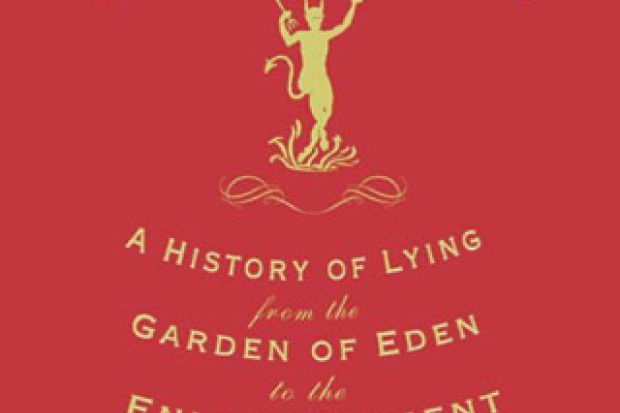In Morten Tyldum’s recent film The Imitation Game, set among code-breakers in the Second World War, Alan Turing suggests that using codes to conceal information is not very different from what we do every day, since people never say what they really mean. Being unable to lie – unable to use the code – is seen as a socially crippling disability. But when exactly did lying become an indispensable social skill?
In The Devil Wins, historian Dallas Denery describes how Western culture has confronted this issue from the Middle Ages to the Enlightenment. The story begins in Hell, with Dante detailing the disgusting punishments inflicted on those guilty of mendacity; it ends, more pleasantly, in the 18th-century salon, where liars meet with a far more lenient treatment. Denery’s reconstruction shows how the understanding of this distinctly human vice stretches across a variety of domains. In the first instance, lying concerned the relationship between man and God: it was a sin, indeed the source of all sins, as the Devil lied to tempt Adam and Eve out of the Garden of Eden. But lying had also important social and political implications. Life at court, as described in Renaissance literature, demanded an almost constant betrayal of truth: courtiers used deceit and flattery to advance their position, or simply to survive. Sovereigns were also required to lie in order to protect the state from its enemies. The honest man who wished to preserve his integrity without renouncing all public commitment was in a very difficult position.
Even in the more tolerant 18th century, the ideal of sincerity and spontaneity set forth by writers such as Rousseau had to coexist with the view that life within civilised society required all of us to make substantial adjustments in the direction of what other people wished to hear. Throughout, the position of women was a special case. They were traditionally described as naturally deceitful, lying being the necessary consequence of their moral and physical weakness. But, as the late medieval French writer Christine de Pizan eloquently pointed out, how could women defend themselves from such accusations when they were not allowed to speak out?
It would be a mistake, Denery warns, to imagine that the evolution of attitudes to lying went from the simple-minded rigour of pre-modern Christian societies to modern complexity. On the contrary, his overview of early theological debates shows how the assessment of mendacity led to infinite complications. Not only did lies come in many grades and varieties, but even the idea that the Devil was responsible for them was contested: what if, for some inscrutable reason, God lied as well? Things became harder still with the advent of the Reformation: in the religious wars of the 16th and 17th centuries, persecuted religious minorities were forced to choose between lying and martyrdom. But once the monopoly of the Catholic Church over the revealed truth broke down, who could tell who was spreading false beliefs? The development of the philosophical exploration of the self, with its new understanding of self-love and self-knowledge, served to blur boundaries between truth and falsity.
Broad reconstructions such as these are necessarily selective in their use of sources: it is a little surprising that Denery should not refer to the work of Michel de Montaigne, possibly the most subtle analyst in modern philosophy of the vagaries of lying and self-deception. Nevertheless, The Devil Wins is a learned and accessible introduction to a fascinating subject.
Biancamaria Fontana is professor of the history of political ideas, University of Lausanne, Switzerland.
The Devil Wins: A History of Lying from the Garden of Eden to the Enlightenment
By Dallas G. Denery II
Princeton University Press, 352pp, £19.95
ISBN 9780691163215 and 9781400852079 (e-book)
Published 28 January 2015
Register to continue
Why register?
- Registration is free and only takes a moment
- Once registered, you can read 3 articles a month
- Sign up for our newsletter
Subscribe
Or subscribe for unlimited access to:
- Unlimited access to news, views, insights & reviews
- Digital editions
- Digital access to THE’s university and college rankings analysis
Already registered or a current subscriber? Login





